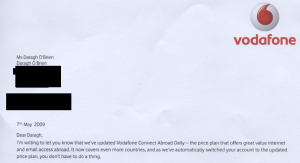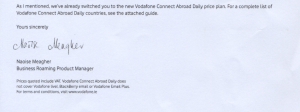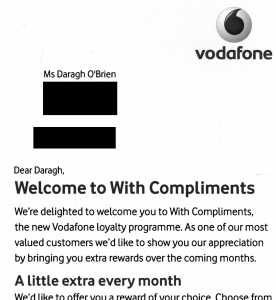Last week I shared a cautionary note about companies relying on their under-touched and under-loved Customer databases to help drive their business as we hit the bottom of the recessionary curve. The elevator pitch synopsis… Caveat emptor – the data may not be what you think it is and you risk irritating your customers if they find errors about them in your data.
Which brings me to Vodafone Ireland and the data they hold about me. I initially thought that the poor quality information they have about me existed only in the database being used to drive their “Mission Red” campaign. For those of you who aren’t aware, “Mission Red” is Vodafone Ireland’s high profile customer intimacy drive wher they are asking customers to vote for their preference of add-on packages. Unfortunately, what I want isn’t listed under their options.
What I want is for Vodafone Ireland to undo the unrequested gender reassignment they’ve subjected me to.
Yes. It does greet me as “Ms Daragh O’Brien“. Â Gender wrong. Surname technically wrong (I’m “O Brien”, not “O’Brien”). But at least they spelled my firstname correctly. Yes indeed, I feel like a “Valued Customer”. Definitely feeling the love.
As I said, I thought it was just the Mission Red datababase that was at fault here, but it turns out that it is actually seems to be common to a number of their databases (or just one broken database). I checked my Vodafone file at home (yes, I file things, in a filing cabinet). and found this letter from May telling me about a new tariff they had put me on.

Here I’m referred to not only as Ms Daragh O Brien, but apparently I’m a business as well, called Daragh O Brien.
The fact that Vodafone think I am now (magically) a business (and one that is owned by a woman at that, I suspect) is confirmed by the signature section of that letter, which proudly announces that the letter is from the “Business Roaming Manager”.

First off… my Vodafone account is a personal account. At one time in the dim and distant past my number was on a work account in a former employer. But that was over 10 years ago. And my former employer wasn’t called “Daragh O Brien”. My account does have a mobile broadband service billed on it but that too is a contract I entered into as a consumer, not a business customer.
This smells of a field being a mandatory field at some point in a process, or of some zealous person populating the Business Name field (question… do they incentivise based on number of completed fields or on the basis of the number of business customers signed up?)
Finally, I don’t think that that tariff is actually applied to my account because I can’t see it listed on my bills. Maybe there is a constistency control in place in the billing systems to prevent people having discounts or services they are not entitled to? This is a common practice in telecoms compliance.
So… Vodafone :
- Have given me a sex change and made me a female.
- View my account, at least in part, as a Business account.
Given that I am definitely male (I double checked… pregnant wife confirms I’m all man) and my account with Vodafone was established as a consumer not as a business, do I think that there is any truth in Vodafone’s statement in their letter of today that I am “one of their most valued customers”?
Frankly no. What I see is a company whose data about me is all over the place to the extent that they are in breach of the Data Protection Act.
How is this a breach of the Data Protection Act? Well, they have a duty to ensure that information about me is kept accurate and up to date. Â This information is not accurate.
Of course, the problems Vodafone have with the correct gender assignment of the name Daragh go back a lot further than these two letters. A quick check in my blog archives turned up this one from Christmas 2007.
Conclusion
Last week I wrote about the information quality risk inherent in using your “Golden Database” if you haven’t paid much attention to caring for or feeding that information asset.
The correspondence I’ve received from Vodafone gives a very clear example of how publishing your ignorance of your customer for them to see as a result of blindly ploughing through your database without any thought to the quality there-of can piss off your customer and damage your relationship with them and can ultimately put you in the postition of being an outright liar (it is painfully clear to me that Vodafone don’t value me as a customer).
The bottom line is that when I do decide it is time to get a mobile phone account for my fledgling business, Vodafone will need to compete now on more than just price because they haven’t cared for my data so they can’t possibly care about me.
If anyone from Vodafone would like to comment on this article and shed light on why they’ve changed my sex (amongst other things), I encourage the right to reply.

Comments
14 responses to “Golden Databases – a slight return”
Great post Daragh.
What I find odd about these situations is not that mistakes happen but how hard it is to rectify the mistake.
Companies invest literally millions with their data management initiatives (eg. MDM, ETL, CDI, insert TLA here … ) but these initiatives don’t actually resolve accuracy, they merely tart up the data already in their possession.
Where is the quick link on the website to make the corrections online?
Where is the freephone hotline that takes you to a rep who can instantly update your records?
This kind of marketing practice is a numbers game, the more data we can massage into something resembling a segmented demographic the faster we can push product.
Everyone sees through the loyalty game, it is about increasing cross/up sell and filtering out poor performing products but loyalty can be washed down the drain if you treat the customer as just a bunch of data elements in a mail shot.
Hopefully your post will serve as a stark reminder of why the customer is always the final arbiter of information quality.
Dylan
I am afraid to say it but I doubt this post will even register with the company in questions (that’s YOU Vodafone).
You have, of course, pipped me to the post with some points I was going to make in a follow up post about simple steps that companies can take to correct or prevent the type of negative impact that poor quality information can have.
At the very least…. let me feel the love not sloppy attempts at a CRM groping.
Orange France managed to get a typo in my name (forgot a letter) when transcribing from a laser-printed document. When I pointed this out to a customer service rep, she told me that I had to send a registered letter to get the name corrected. I replied that I was not going to do this, and that if they preferred to have bad data, it was their problem…
Yves,
Ah, you have to love telecoms companies and their decidedly poor understanding of the process that should actually be followed. I am tempted to send a subject access request to Vodafone under the Data Protection Act (and France has similar laws on foot of EU Directive 95/46/EC) requesting copies of ALL data they hold about me, including information held in hard copy files. The maximum they can charge me is €6.35 (maximum fee in Ireland – not sure about France).
I take it that you are not an Orange FR customer, or do you just chuckle at their crappy data every time they try to sell you something new?
No, I am an Orange France customer, but will not bother typing a letter, take it to the post office, and pay the registered letter fee, just because some idiot agent couldn’t type right when they entered my contract in their system. And as Dylan pointed out, why won’t they let me correct it online or on the phone?
The day they want to start doing MDM on me (I also have a 3G contract and a home phone line with them), I wish them good luck…
As I thought. I suspect that their process is actually overly onerous to the point of perhaps being illegal under Data Protection rules (they have a duty to correct errors when notified of them). The solution Dylan suggests is the ideal one and makes the most common sense, particularly where the error is theirs.
You are right – when they decide to to a CRM integration of your Customer entity they will have lot of fun(?) trying to figure out if all 3 are the same person.
Here’s another one for you Daragh, and it comes from your old pals…
When I set up my eircom account seven years ago, I requested that the account would be set up in both my name and my wife’s name. I was assured at the time that this was not a problem, but you already have great experience of how well they f%@* things up there. My name now appears on my bill as:
MR PAUL HELEN &BEGG
It’s interesting how “Beggs” became “&BEGG”. I later asked them to correct this (stop laughing). The name stayed the same, but I now apparently either work for a company or live at a house entitled “PAUL&HELEN BEGGS”
At least they got the information in there somewhere.
Paul
At least eircom haven’t surgically removed your nuts like Vodafone have done to me.
The key root cause of your problem there is a failure to ensure continued investment and maintenance in the processes that take account data and turn it into customer gold, and further into how that information is then extracted and presented to customers via bills and marketing data. The bill data was managed by the Billing section. Nothing to do with me.
Suffice it to say that I was the evangelist and advocate of proper management of customer data overall and they had no qualms about approving my application for redundancy (and I’m now preculded from doing work there for a while as a contractor). I have tales a plenty that I can’t tell yet. Problems like yours were not unique. But apparently they are buying a whole heap of new software that will make everything OK, because that has worked well in the past.
The fact that they made you a business customer is interesting. Has your account type been changed to a Business as well? That screws up their segmentation models….. Somebody obviously thought that that would fix the problem.
…. must take purple pill now as I am having flashbacks.
The account type is still Residential. You’re probably right in saying that someone just thought that adding a business name would fix the problem, rather than going in and actually fixing the problem.
So what they have done here is put your perferred form of salutation (Mr & Mrs Beggs) into the Building Name field of the billing address in the billing system (billing and install addresses are two separate concepts, for obvious reasons).
In other words… your house is named after you now.
This would cause no end of problems in downstream processes such as customer matching, fraud profiling, credit risk profiling (i.e. where they might try to match data from Experian against the customer database to spot potential dodgy geezers).
My old team spotted a lot of this when profiling the data ahead of a planned data migration a few years back (the project didn’t run in the end). I wonder if the teams working on future data migrations will take the time to understand this lovely behavioural quirk or will they just suck and dump data from “Building Name” field in system A to “Building Name” field in System B (my money, unfortunately, is on the latter).
Of course, in your specific case the real problem is the bill generation process which obviously can’t process extended character set characters like ampersands. Or accented characters. Imagine if your name was Pól & Helen Beggs. The middle of your name would be mangled as well.
But, what would I know about these things.
Just for good measure, here’s a new one I got this morning. Airtricity sent me a letter to confirm my request to switch to their service and the bank details I had provided to them. The letter was addressed to “PAUL BEGGS T/A BAWNMARE ENTERPRISES”.
Really? I run a company called Bawnmare Enterprises?
I did a search for this company and it doesn’t exist. What does exist, however, is a company called Bawnmore Enterprises, a direct sales firm operating in Galway, Longford and Westmeath. I’m guessing these are the guys who called to my door to get me to sign up to Airtricity in the first place…
Oh… that a doozy as there is a potential breach of the DPA there. The information about you that they hold is not accurate. That’s a basic element of the Data Protection principles (which are actually called principles for Data Quality in the Directive).
[…] significant effects on the quality of the findings. His post was inspired by recent posts here and here about “Golden Databases“. I’m glad to give Colin a chance to try his blogging […]
[…] wrong can have negative effects on your business and your relationship with your customers (like my on-going gripe with Vodafone). But often companies need to accept the “fuzziness” of identity in order to match […]